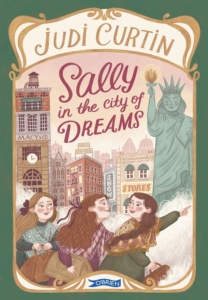
Exploring the City of Dreams An interview with Judi Curtin
Judi Curtin is a favourite with many young readers who love her warm, engaging stories of friends and pre-teen/early teen life. With two best-selling contemporary-set series to her name, she’s recently moved into writing adventures set in the past (via the Molly and Beth time travel series) with the Lissadell books. Her new novel, Sally in the City of Dreams, is also set in the past and follows two young sisters, Sally and Bridget, as they leave Ireland for new lives in New York at the beginning of the 20th century. Told with her signature liveliness and warmth, this time she draws on her own family history too. Andrea Reece spoke to Judi Curtin about the book for Books for Keeps.
 With four books published in the Lissadell series and now Sally in the City of Dreams, Judi is clearly enjoying writing historical fiction for children, yet she admits she didn’t see the appeal at first, ‘I wrote the first Lissadell book because my publishers thought it might be a nice direction’, she says. ‘I resisted initially, but once I’d picked up that ball and run with it, I loved it. I like the mix of getting the historical data as accurate as possible but having the opportunity to play around with characters in the past.’
With four books published in the Lissadell series and now Sally in the City of Dreams, Judi is clearly enjoying writing historical fiction for children, yet she admits she didn’t see the appeal at first, ‘I wrote the first Lissadell book because my publishers thought it might be a nice direction’, she says. ‘I resisted initially, but once I’d picked up that ball and run with it, I loved it. I like the mix of getting the historical data as accurate as possible but having the opportunity to play around with characters in the past.’
The story for Sally in the City of Dreams started quite close to home. ‘My granny, my dad’s mum, went to America as a young girl with her sister, just as Sally does’, she explains. ‘Sadly, even though she was alive for part my youth, I never asked her the questions I wish I’d asked now. After she’d died, I used to wonder what it must have been like for a girl to go from a very rural place, a tiny village in County Kerry, to Brooklyn, the centre of New York, with the buzz and the excitement of it all.’
She did a lot of reading as research but had some wonderful source material to explore too. ‘My sister had acquired a trunk that came back from America with my granny’s sister. The trunk was full of letters, and I just fell down a rabbit hole reading all these letters written more than a hundred years ago. They reminded me that even though these girls were sad at being far from home, and if there was bad news from home they were far away and communication was difficult, yet they had a lot of fun. They were young girls in an exciting part of the world so of course they had great fun a lot of the time.’
Sally and Bridget do have lots of fun, but they also have to deal with an upsetting prejudice against Irish people. Sally is employed as a nanny and her employer, even though she is kind and generous, initially won’t let Sally take her young charge to the park fearing that she may kidnap him, while Bridget is wrongly arrested, her nationality regarded as virtually synonymous with criminal. When Judi’s grandmother talked about her own employer it was with real affection, and in fact she kept a photo of her on the wall of her living room, but Judi’s research revealed how badly Irish people, particularly Irish women in fact, were treated by some sectors of the population. She references Bad Bridget by Elaine Farrell and Leanne McCormick, a book that helped with the research. ‘It was doubted for a while but has since been proven, that there were a lot of newspaper ads, “no Irish need apply”. It’s just cruel, but reminds us now, as people come to our country, that kindness counts for a lot’. She’s adamant that she’s not writing ‘preachy’ books, ‘But it is good for young people to see from the point of view of Sally how she’s being judged not for anything she’s ever done but because of who she is. That’s been there throughout our history and though nowadays you wouldn’t be allowed to put up signs like that there are still forms of subtle racism going on.’
Her stories always start with the characters. ‘Yes, characters first, plot comes later, and by the time the plot develops I’m really invested in the characters’ happiness and their success in the world.’ She quotes a writer friend who advises ‘throwing stones at your characters’ though, and she does quite a bit of that. The sisters’ new friend Julia for example is trying to find the brother she hasn’t seen since she was a toddler and who seems to have vanished into America. ‘I thought it would be interesting for children nowadays to experience that situation and understand you can’t just pick up your phone and text him – Julia has an address and that’s all she has, and in a city of millions of people if that doesn’t work out, you’ve a problem.’ Then there’s Bridget’s arrest and subsequent trial for a crime she didn’t commit. ‘I had fun with that storyline and showing how it affects Bridget. She’s a feisty character, always brave and fun, but she’s knocked down quite a bit by this false accusation.’
Fortunately, Sally is there and in a trial scene Harper Lee might envy, convinces the judge of her sister’s innocence in a particularly deft bit of stage management and with the use of props. ‘I strayed a little bit from real practice there,’ says Judi, laughing, ‘and had a different plan for how Sally was going to plead Bridget’s case originally, then the idea just came to me, and I thought even if it’s not strictly historically accurate, I’m going for that. I hope children will like it; Sally’s just an ordinary girl, but she manages to use logic and common sense to surprise everyone else.’
Sally is narrator of the book. By far the quieter of the two sisters, she’s a wonderful observer of the action, while her letters home convey huge amounts of information and background in a couple of paragraphs. ‘I do like first person narration’ says Judi, ‘and I love the letters. I wrote a book with Roisin Meaney called See If I Care in which the two main characters were pen pals and that was great fun!’ She’s considering writing a whole book through letters, though there’s no immediate plan for that.
And will there be more adventures for Sally, Bridget and Julia? ‘Now that’s the Million Dollar Question! Everyone one of my series started out a standalone. Lily at Lissadell in particular, when I got to the end of book one I knew I wasn’t done with her and I’m fairly sure I’m not done with Sally and Bridget either. I’m exploring a few different plotlines, which could concentrate more on Bridget or Julia or there’s a minor character called Inky, who’s always in trouble, we don’t really meet her, just hear a bit about her, and I think, there might be a book in her you know, or at least a few episodes….’
Let’s hope so, because for sheer, unadulterated reading pleasure, there’s little that matches Sally in the City of Dreams.
Andrea Reece is Managing Editor of Books for Keeps.
Sally in the City of Dreams by Judi Curtin is published by the O’Brien Press, 978-1788494519, £11.99 pbk.





